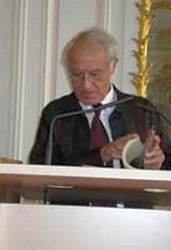
Stallworthy argues that society today is suffering from a sort of "trench-tunnel vision," and that our collective newsreel seems to be "jammed at the Somme, in 1916." He makes the case that the current curriculum could be benefited if it "replaced some of the weaker poets of the First World War with some of the stronger poets of the Second," and he goes on to outline such a syllabus, to include: the call to arms for poets during the Spanish Civil War; the American poets; poems by veterans; and, specifically, the work of John Balaban, a conscientious objector who was in Vietnam during the Tet Offensive. The talk is about 30 minutes long:
Professor Jon Stallworthy, Teaching World War One Literature
Amusingly, at several points during his presentation, Stallworthy is compelled to admit that he, himself, is at least partly to blame for the continuing over-emphasis on and popularity of First World War poetry.
There also appears (at about 7:15) an amazing mention of a failed proposal to install a plaque at Poet's Corner for the poets of World War II, including Henry Reed. Stallworthy says:
How often have we all had to ask the question, 'Why, when there was so much marvelous poetry from the First World War, was there none from the Second?' The double misperception can only be the fault of an educational system that over-values the one, and is ignorant of the second.
If you doubt the accuracy of that statement, consider these facts: First, that in Poet's Corner of Westminster Abbey, a stone commemorating the poets of the Great War carries the names of Laurence Binyon, Wilfred Gibson, Robert Nichols, and Herbert Read, among others. Second, that the Dean of Westminster and his advisors have rejected a proposal that a similar stone, commemorating voices from the Second World War, should be erected to carry the names of four much better poets (of whom I'll have more to say, later): Keith Douglas, Sidney Keyes, Alun Lewis, and Henry Reed.
If you doubt the accuracy of that statement, consider these facts: First, that in Poet's Corner of Westminster Abbey, a stone commemorating the poets of the Great War carries the names of Laurence Binyon, Wilfred Gibson, Robert Nichols, and Herbert Read, among others. Second, that the Dean of Westminster and his advisors have rejected a proposal that a similar stone, commemorating voices from the Second World War, should be erected to carry the names of four much better poets (of whom I'll have more to say, later): Keith Douglas, Sidney Keyes, Alun Lewis, and Henry Reed.
Curiously, I can't find any other references to the proposed memorial for World War II poets. That would be a big deal! Do you know anything about it?
Professor Stallworthy's talk is archived on the "Podcasts" page of The First World War Poetry Digital Archive. (And he is in good company, with Tim Kendall presenting a paper on Ivor Gurney, just below!)







